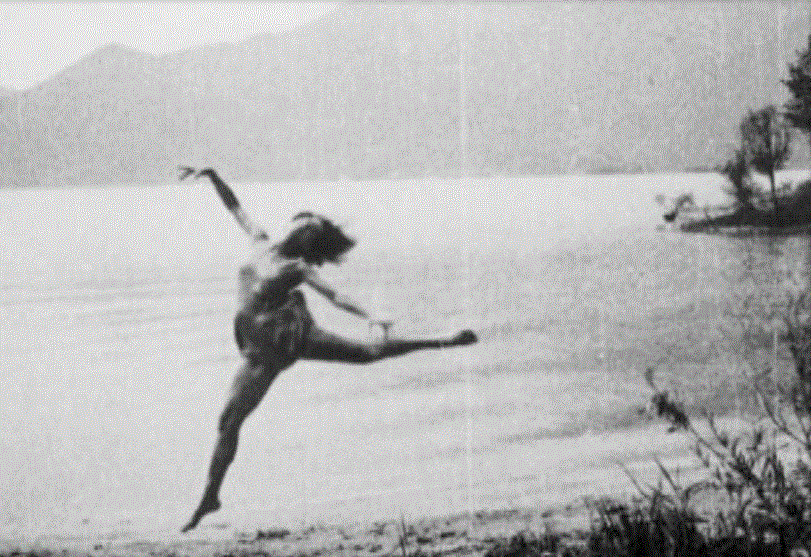Interviews
Booker Prize Shortlisted “Ducks, Newburyport” Is a 1040-Page Long Sentence
Lucy Ellmann does not care about what male reviewers think about having to read such a long book written about a woman

There’s so much to say about Lucy Ellmann’s wondrous novel, Ducks, Newburyport: ostensibly it’s about an Ohioan housewife deep in thought while peeling apples and prepping to make a tart. It’s also about a mountain lioness searching for her cubs and attempting to survive in her shrinking natural habitat. But even more than that, it’s about tackling the novel as a form and modernism as a lens for the human condition.
At over a thousand pages, it’s a stream-of-conscious narrative that reads so freely, it takes on eerie similarities to how we scroll through our social media newsfeeds. The book is a perfect example of publishing as an art, a medium based on amplifying voices and social issues rather than the all-too-often trade fixation on bottom-line sales and marketability of a book and its author. It’s also grabbing the attention of critics and readers everywhere, perhaps most important of all—it has been nominated for the 2019 Booker Prize.
Ducks, Newburyport is a complex book about a complicated time. It reads like an outpour of humanity beckoning to be heard. I spoke with Lucy Ellmann about narrative rhythm, ecological disaster, the meaning of “big books,” and more.
Michael J Seidlinger: It will come as no surprise, and I normally hate asking this question, but I got to ask, how long did it take you to write the book?
Lucy Ellmann: Seven years. And throughout, I wondered if I’d ever finish it. The work got more and more intense. I saw no one, barely even saw my own husband! (I think he was the guy cooking the meals.) I did nothing else but work on the book, if I could help it – or worry about it when I wasn’t doing it… Oi veh. What a mug’s game.
All real writing is literature and men don’t own that. It belongs to us all.
There’s this anxiety that you’ll die before you finish writing a book—I think everyone has it. Those 3:00 a.m. jitters. It just means you must work even harder on it.
My father once told me that when you reach a tough juncture in what you’re writing, it’s actually a sign that you’re on the verge of a breakthrough. This advice, correct or not, serves me well through many a tough juncture.
MJS: The structure is so compelling, an outright onslaught of text. Did you instill any specific constraints or writing techniques to keep the thread moving and, more importantly, evolving into its attentive monologue?
LE: No. Constraints are no help when you’re trying to figure out what the novel you’re writing is going to be. It’s got to be as venturesome a process as possible.
I wanted to blanket the reader in stuff, American stuff. Minds are full of stuff, and that seems to me the most interesting thing in the world. External beauties are just an added bonus. But even they are reached through the mind. So let’s look at the mind.
MJS: 1040 pages. It means dropping the book on your face while reading it can be painful. (Don’t ask me why I know this). The physicality of the book informs its structure. The “big book” is so often attached to the “big serious” author, usually male, with their warrior-like obsession with tackling and “succeeding” in creating formally inventive, innovative, experimental works. At its worst, it borders on masturbatory; at its best, like in your book, it acts as a reminder of the importance of literature. Ulysses, Infinite Jest, Life: A User’s Manual—why do you think it more common to see these “experimental works” attached to such an obsessive, “hero” intent?
LE: A friend of ours, Abe Steinberg, once saw a NYC cop writing himself a ticket for parking in a no-parking zone. Abe’s comment: “So he’s a hypocrite and an onanist.”
You rightly assign an Oedipal flavor to the contest some men make of writing: superseding the father, fucking the mother… Yeah, yeah, yeah. Men have long placed the goal posts and then proceeded to hand themselves awards for getting the ball in. Or just for having a pair of balls. Time to invent some new games. New myths too. And some respect for what women have to offer. All real writing is literature and, as you say, men don’t own that. It belongs to us all.
My books are sincere efforts to contribute to that. I really don’t concern myself with what male writers are up to, unless they write something good. That’s always welcome. As for Ulysses, whatever amount of testosterone may have fueled it, it is a beautiful work of art. I would not class Joyce as a conscious member of the macho brigade. He wasn’t that proud of himself. He could barely find the means to live – but hoo boy did he have what it takes to write. And he stuck up for it, as you must at some stage. Good writing emanates from a peculiar combination of self-hatred plus chutzpah.
Some male reviewers seem affronted by the book’s length. They also resent having to read such a long book written by a woman about a woman. But most men don’t even read, so who cares?
I never set out to write a big long book, but nor did I set out to censor myself. I just did what I wanted. Some male reviewers seem affronted by the book’s length. This seems a pretty petty form of criticism. You can see the book’s long just by looking at it, so don’t agree to review it if you or your biceps are not up to the job.
They also resent having to read such a long book written by a woman about a woman, two points against it in terms of their criteria for seriousness. But most men don’t even read, so who cares? I’m interested in readers who can read, not people suffering from pride and prejudice. (Good title!)
For the record, my book is not an “experiment,” it’s a novel. Experiments are for scientists. Of whom I take a dim view. Sure, it’s nice to know a bit about the galaxy and all, or investigate a curiosity here and there and whatnot – but these contributions don’t make up for vivisection, IVF gender selection, heavy industry, factory farming and the hydrogen bomb. I see art as a vital moral check on the unbridled extravagances, patriarchal illogic, and often outright malevolence of science. Not “the science” that the great Greta Thunberg’s talking about, but much else that goes merrily on.
(NB Sorry you had a physical collision with my book; all clonkings were meant to be intellectual.)
MJS: Haha, and the clonking was indeed intellectual! About 20 pages in, something uncanny happens: the book becomes as readable as scrolling through Twitter, reading a sequence of facts and headlines. Propulsion of excess, the very thing we deal with in our 24/7 news cycle, forever-online, modern day: I’m curious about how you balanced this effect.
LE: Rhythm decides a lot of the order of things, plus juxtaposing inner and outer life, or output and input. The narrator naturally drifts between private thoughts and what’s going on in her day, or in the wider world, which she’s exposed to by her fact-addicted son, and other people she talks to, along with various media services of varying objectionability.
The action takes place over the course of a few months in 2017, and there is also a gradually emerging plot; it’s not reported in the habitual style of conventional narrative, but it’s there all the same. I wanted to see how a novel can stand on its own two feet and start developing narrative tension almost of its own accord. As a reader, I think one constantly raises questions, and from that springs suspense. You don’t actually need cliffhangers or a “once upon a time” approach. Readers are much more sophisticated than that.
MJS: That being said, the absence of a “traditional narrative” in the book almost enforces the reader’s search for one, and that’s where maybe the lioness, a sort of side story to the stream of text, comes in. Why did you choose the lioness over, say, a fox, or vixen? Both of their natural habitats are being destroyed by humans, and both are under threat of being endangered.
Good writing emanates from a peculiar combination of self-hatred plus chutzpah.
LE: The first idea of the lioness came from reports in Palo Alto, California, of mountain lions venturing near schools. Utterly unnecessary anti-lion measures were of course employed by hysterical humans. We own everything, and we can’t bring ourselves to share one single inch of space with fellow creatures without our permission.
Animals are the ultimate illegal immigrants. That’s why we get to confiscate their offspring, and look at them caged in zoos. It’s amazing how little people question their right to have things all their way – at the risk of destroying the whole ecosystem.
MJS: The book’s facts function as memories and, when taken as a whole, it almost suggests that our memories are impermanent, lost in the haze between news and novel, gossip and guilt. Do you think our memories are being rewired into a dispensary of everything we consume daily? Maybe we’re confusing documenting our lives online as memories.
LE: I just began thinking how weird memory is, its occasional precision, its eagerness, like dreams, to slip into oblivion. So much gets lost, even the byplay of a conversation you just had one goddam minute ago! I hate that. Writing acts as an enemy of lost ideas, because they can be retrieved – to some extent – through words. As prods at least, that can trigger memories.
I find dreams really funny if you write them down. Not the endless ones – oh, so dull, always to be avoided, either in literature or in conversation – but a nice short snappy crazy dream works well on the page.
MJS: The fact that there’s so much here, the stream could have gone a whole lot longer, the fact that you’ve squarely cut a slice of modern life, with all its hues, the fact that I feel there really isn’t an end, I ask if you had a veritable end to the narrative stream, or maybe it’s that there are no ends, only deaths, the fact that believing that to be true can make a person sad, the fact that I’ve taken this interview to a depressing place, maybe it’s time to, at least in this interview’s case, have it end.
LE: Death is our shockingly crummy fate. But depression is a cop-out. What the world needs now is action, sweet action—as Dionne Warwick might have sung. Is none of this stuff we have worth saving? The natural world? Human culture? The stuff we’ve made. The sights we’ve seen. Greek vases. Jane Austen. We have to fight for these things! Fight against the destroyers in our midst who want to take everything from the earth and leave nothing behind but radioactive waste. Do they have another planet lined up for themselves already? Just for them and their philistine buddies, a Lolita Island in the sky somewhere. They sure act like it.









